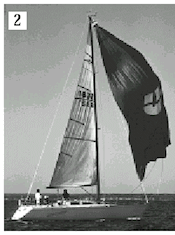UK Sailmakers’ Encyclopedia of Sails
7.3 – Jibing the Cruising Spinnaker
Jibing is easy when you follow a few tips;
1. Start the process by steering so that the wind is approximately 150 degrees over the wind-ward quarter.Trim the mainsail tight so that the boom is over the boat. (Photo 1)
2. Trimming the main tight is the trick to a smooth jibe, because the next step is to ease the Flasher ® sheet until the entire sail is streaming out in front of the boat (Photo 2). If the main is not trimmed tight, it blankets the Flasher ® , preventing it from being blown out in front of the headstay.
3. Next turn the stern of the boat through the eye of the wind, jibing the boat. As you turn, the boom comes across and the clew of the Flasher crosses to the new leeward side.(Photo 3)
4. Trim the Flasher ® and then ease the mainsheet. (Photo 4)
THE CRUISING SPINNAKER Stasher
The Stasher is a sleeve that contains the Flasher ® , allowing you to easily raise and lower the sail under complete control. Your Flasher ® needs to be installed in the Stasher only once. After that they stay together, whether in use or in the bag.
To install a Flasher ® in a Stasher, lay your Flasher ® out in a clean, open space with the head at one end and the two clews together at the other. Pull the head up through the Stasher sleeve and connect the Flasher ® to the shackle at the bottom of the wire pendant at the top of the unit. The pendant allows the Stasher to sit above the head of your Flasher ® when not in use.
Using Your Stasher
Once your Flasher ® is installed in the Stasher, the set-up is exactly the same as setting up a Flasher ® without a Stasher. The only difference is that your halyard is attached to the top of the wire pendant instead of directly to the Flasher ®.
To set, hoist your Flasher ® in the Stasher sleeve with the tack and sheet attached in the normal manner. Be sure to leave some slack in the Flasher ® sheet while hoisting.
Once the Flasher ® is up and the halyard is cleated, stand near the bow, pull on the Stasher halyard (a continuous line built into the sleeve, not to be confused with the spinnaker halyard) and raise the sleeve so that it is completely above the Flasher ®.
At this point, trim your sheet as described previously. Once the Stasher is raised to the top of the sail, secure the end of Stasher halyard to the mast to prevent it from dangling out of reach.
To douse, turn downwind to blanket the Flasher ® with your main, ease the Flasher ® sheet, and pull down on the Stasher halyard. Once the Stasher encases the sail, lower Flasher ® and Stasher together and put the combo in its bag. There is no need to repack the Flasher ® for your next set. Just hook up and set. The Stasher is so easy to use, and offers so much control over the Flasher ® , that some sailors use it to control the sail while jibing. Before jibing, lower the Stasher over the sail, pull the sleeved sail around the forestay and then reset the sail by raising the Stasher.




